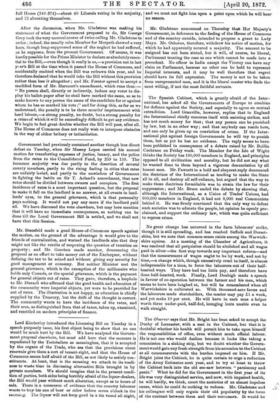After the discussion, when Mr. Gladstone was making his statement
of what the Government proposed to do, Sir George Grey took the very unusual course of twice calling Mr. Gladstone to order ; indeed, the usually calm Member for Morpeth showed a very keen, though long-suppressed sense of the neglect he had suffered, as he supposes, from the present Government. Of course, it was hardly possible for the Prime Minister to declare as absolutely essen- tial to the Bill,—even though it really is so,—a provision not in last year's Bill at the time when it passed the House of Commons, and accidentally omitted when the Bill was redrawn this year, and he therefore declared that he would take the Bill without this provision rather than lose it altogether ; and Mr. Forster agreed to accept a modified form of Mr. Harcourt's amendment, which runs thus:— " No person shall, directly or indirectly, induce any voter to dis- play his ballot-paper after he shall have marked the same, so as to make known to any person the name of the candidate for or against whom be has so marked his vote ;" and for doing this, as far as we understand, the penalty is to be three months' imprisonment with hard labour,—a strong penalty, no doubt, but a strong penalty for a crime of which it will be exceedingly difficult to get any evidence. We begin to feel great doubts whether the Bill will pass, after all. The House of Commons does not really wish to interpose obstacles in the way of either bribery or intimidation.


































 Previous page
Previous page